
 

New Thinking for
New Times
The new context of politics
Anthony Giddens
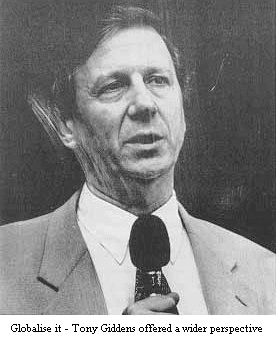 We live, today, in a world full of surprises. Who would
have foreseen, a few years ago, that communism in eastern Europe
would be peacefully dismantled after 1989? Who would have foreseen
that a vicious war would exist almost in the centre of Europe? We live, today, in a world full of surprises. Who would
have foreseen, a few years ago, that communism in eastern Europe
would be peacefully dismantled after 1989? Who would have foreseen
that a vicious war would exist almost in the centre of Europe?
On a more positive note, who would have foreseen that there would
be a peace process in the middle east or that massive changes
could happen in South Africa, without the violence which most
people of all political persuasions expected there? And who would
have foreseen that there could be a peace process in Northern
Ireland, which looks - we all hope - as though it will be successful
and longstanding?
Considering all these changes, one begins with a conclusion -
that they cannot be separate from one another. These events going
on across the world cannot surely be understood as independent
happenings, but must, in some way, be linked. How they are linked
is the theme I explore here.
We are living in a world undergoing very, very profound transformations.
Not only do these help us understand what has happened here over
the past three or four years-and over a longer period too-but
also one can't really work out what will happen in the future
in Ireland without looking at these broader processes of change,
transforming the world as a whole.
There are three sets of massive changes going on today, in the
social, political and economic worlds. There are other changes
too, but I'll concentrate on these three, which are producing
something of a seismic shift in the sorts of society in which
we live, which have caused us to break in some ways with the past,
but which also allow us to think innovatively about the future.
First of all, we've all become dramatically conscious over
the past few years that we live in a world undergoing massive
'globalisation'. Globalisation is the prime agenda of our lives
today, though it is not yet very well understood. One has only
to pick up the newspapers to see how a word which no one really
mentioned even 10 years ago is now discussed with extraordinary
frequency.
There are many such discussions in the economic press. There,
one sees globalisation identified with competition in worldwide
economic markets-the idea being that we live in a much more integrated
global economy than we ever did previously, and that this economic
globalisation is accelerating. Now, with reservations, this is
true. It is true that we can't carry on our economic lives in
the way we once did.
Think of what's happened over the past 30 or 40 years: not only
the collapse of communism, the collapse of a certain way of organising
the economy through centralised direction; but at the same time,
in all western countries, a crisis of the welfare state and the
crumbling of what seemed the very foundation of economic theory,
Keynesianism. These things are plainly not unrelated: they are
bound up with global economic competition, and it's clear to everybody,
whether on the right or the left, that conditions of economic
competitiveness are different now from what they were even a quarter
of a century ago.
But this is not the most fundamental sense in which globalisation
is changing our lives, so it will not do simply to concentrate
on the importance of global economic competition, essential though
that now is. We should rather understand by globalisation something
more profound - a transformation of our personal lives, our local
lives, in the context of much larger global events.
What has been the leading influence in the globalisation of society
over the past 20 or 30 years? The communications media. A technological
fix on the change in the nature of the global expansion of the
west across the rest of the world is offered by the establishment,
some 30 or 40 years ago, of the first global satellite communications
system. When one has global satellite communications, one can
have instantaneous communication across the world.
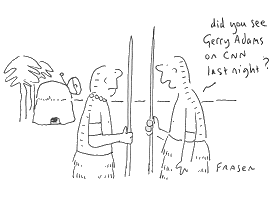
And when one has instantaneous electronic communication across
the world, one doesn't only shift economic things. Certainly,
24-hour global money markets weren't possible before the marriage
of information technology and global satellite systems. But one
doesn't only have economic transformations: there are transformations
in experience, in nature, the way we lead our lives; there are
major transitions in the nature of the state; and, particularly
importantly, we now live a new agenda. This links our personal
lives much more closely than ever before with global futures and,
in turn, links global events much more directly with our personal
experience.
Two sorts of experiments, as it were, are going on in the world.
One has a grand experiment on the global level: what will we make
of an industrialising world with the first global economy that's
ever existed, if there is not much prior experience on which we
can build? But also our everyday lives, in a certain sense, have
become experimental: look at the changes affecting the relationship
between the sexes, at this fantastic debate over 'family values',
now seen throughout the world-in third-world as much as first-world
countries.
What is the reason for this? It is a shift in how we live our
everyday lives, associated of course with claims of women to power
which they didn't have before, but associated with many other
seismic changes too. One has to understand the conjunction of
change, therefore-linking personal, even emotional, experience
with much larger global events-and that electronic communication
plays a central role, shifting the texture of how we live our
lives.
This means that when one speaks of a society-Northern Ireland,
Ireland, the United Kingdom or the wider European society-it's
going to mean something different from what it used to mean, even
a couple of decades ago.
Associated with globalisation - if globalisation means shifts
in space and time, transformations in the ways we relate our experience
to larger systems- one sees a second set of changes everywhere
in the world. These are the sweeping effects of what sociologists,
if one can forgive the 'sociologese', have come to call 'detraditionalisation'.
Detraditionalisation means that globalising processes eat into,
attack, local customs and traditions, local ways of doing things.
They do so in our personal lives at the same time as they do so
at the level of the nation-state, and larger systems too.
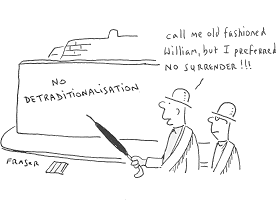
For about 150 years, with the advent of modern industrial society,
there was a collaboration between modernisation and industrialisation
on the one hand, and tradition on the other. Industrialisation
destroyed a lot of the pre-modern world. But, at the same time,
there was an accommodation: tradition persisted in the 19th century,
in the invention of nationalism, the resurgence of religious movements
and, especially, in everyday life. There was a retraditionalisation
of the family, of gender, of various aspects of personal life.
That's what made modern society stable - a marriage of modernity
and tradition.
In a globalising world, with the immediate and shattering effects
of electronic communication - a much more urgently cosmopolitan
world - this marriage of modernity and tradition becomes prised
apart.
In our local lives, detraditionalisation means, for example, that
women are no longer simply just 'women'. One has to decide
what it is to be a woman. One has to decide now even what
it is to be a man - something which is very unusual and difficult
for men to do. But this is certainly going to occupy our lives
in the future: gender identity is no longer fixed, no longer given;
it's something we have to achieve. The same applies to family
life: the family is no longer something given.
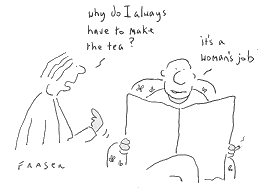
We don't accept our lives any longer as fate. Even a quarter century
ago, if one was a woman it was one's 'fate' probably to have children,
to live in the domestic milieu, maybe to work part-time. It was
one's 'fate' as a man to leave school or college, get a job, retire
at 65 and spend the rest of one's life wondering what to do. We
don't live our lives as fate any more, so these things no longer
hold for either sex or in family life. One has today to construct
an emotional life much more actively than ever before.
That's why there's no sense talking about going back to the 'traditional
family'. We're stuck with the democratisation of family life,
of which we have to make the best. Again, we don't know quite
where it will lead, but there is no turning back from that.
The detraditionalisation of local life is much more important
than many people would accept. It intersects with economic development;
it intersects with politics; it becomes a meeting-point of what
one does in one's working life, in respect of the other groups
to which one belongs and where one casts one's vote.
At the level of the state, we see everywhere that leaders can
no longer lead. Why are all leaders suddenly lacklustre? It's
not just because the individuals involved have become so; rather,
when detraditionalisation affects the political system, one simply
can't depend on the same deference as before. Again, we see this
happening throughout the world, not just in the west; there are
massive problems for political leadership, plainly related to
the 'hollowing out' of the nation-state both below and above the
level of political action.
What some sociologists, if one can again forgive the terminology,
have called 'the politics of un-politics' is set to become much
more important. This refers to the very many changes going on
in society - such as women's claims to new autonomy in everyday
life - which do not emanate from the political sphere, but to which
the political sphere must respond. The state, in some sense, must
respond to these claims, even though they are not, by and large,
first established within the political system. The political system
has lost a good deal of the autonomy it once had. It doesn't follow,
however, that it can't re-establish it.
What does follows from this is that in personal life, in business
and in the state we will depend much more upon active trust, rather
than a passive acceptance of fixed roles, fixed economic systems -
of work for life and all the rest of it. Active trust entails
having to gain the trust of others in an active fashion - having
to recognise that one is dependent on them, no matter how much
power formally one has over them. This is one of the reasons why
the shape of economic organisation and political structures has
changed.
Bureaucracy, after all, used to work. It used to work in the period
of Keynesianism and the dominant theory of organisations, until
relatively recently, was that the more bureaucratic the industrial
organisation, the more effective it would be. Now everyone is
escaping from bureaucracy. Why? Not just because of the impact
of new technology, but because of the impact of this wider set
of changes.
If one is going to have the active trust of a workforce, one must
give that workforce some autonomy. Giving them autonomy means
a much more flexible authority system and, in a world of decentred
globalisation - where it's no longer true that West is Best - an 'Easternisation'
of industry is not surprising. One no longer speaks of Westernisation;
there are many aspects of Easternisation going on today: bottom-up
decision-making, non-hierarchical systems of authority and so
forth.
These things all belong together. They are not different from
what's going on in the sphere of the family, and they are not
different from what's going on in the sphere of politics.
In all these cases, therefore, it is possible to retrieve legitimacy.
It is possible to restabilise, for example, the political system.
One isn't stuck with a society where politics no longer counts
for anything, but we won't be able to make it count for something
without acknowledging the importance of new systems of authority,
symbolism and legitimacy, which depend on active trust.
Active trust normally means a much more volatile electorate - shifts
in political allegiance, surprises. The sort of surprises that
have happened in Canadian politics or in the United States, where
no one really anticipated the election of Bill Clinton, and very
few anticipated the sudden resurgence of the Republicans. Such
things will probably become more commonplace in a detraditionalised
world, where one has to build trust much more actively, where
trust and risk become central organising notions for us.
Take what happens when one gets married, for example. One got
married 30 or 40 years ago, in most western societies, with some
sense that one knew what one was doing. Marriage was an established
role relationship: one knew what it was; one knew what expectations
followed. If one gets married now, this is no longer true: one
does so against a backdrop of a very high divorce rate, in lots
of western countries anyway. Anyone who gets married now knows
that women stake much more claim to autonomy than before.
Everyone knows that traditional family systems are in some sense
dissolving. Everyone knows there is a fierce debate about all
these things. These are not just external environments to one's
decision: they are part and parcel of what that decision is. There
is an important sense in which, when one gets married now, one
doesn't really know what one is doing. One is participating in
an experimental relationship, both for oneself and the wider society.
A lot of our life has become like that, producing enormous anxieties
for all of us, but also producing some very interesting new opportunities.
The third set of changes, linked to the others, is the
development of a much more active, 'reflexive', citizenry. One
may often read in popular accounts of what's happening in politics,
what's happening in economic life, what's happening in emotional
domains, that we're paralysed - that people are disempowered by
living in a global economy, by living in a globalising society.
And this is, to some extent, true. On the other hand, living in
such a society means one cannot but be active in relation to it.
The more tradition releases its hold, the more we no longer live
our lives as fate, the more it's true that in some sense we must
actively grasp control of our circumstances - read, acquire knowledge
about what we do and, through using that knowledge, reorganise
what we do. That's what it's like to live in a reflexive world.
A reflexive world is not an increasingly self-conscious world:
it's a world where one must use lots of sources of information
about one's life.
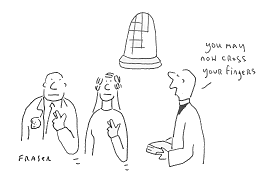
It doesn't matter whether one is an individual, whether one is
running a big corporation or whether one is running a state; we
all live in this information environment today, where one must
use information about the outside world to live in the outside
world, but where that information may be too much to handle may
be inconsistent, may be changeable - there are many difficulties
in dealing, reflexively, with an enclosed information environment
of the sort we now have to handle.
Consider, for example, the simple decision of what to eat for
breakfast. A lot of people eat muesli for their breakfast in the
belief that muesli is healthy, that it helps one to stave off
various illnesses from which one might suffer. Latest research
seems to indicate that muesli isn't very healthy at all, and that
certain things we used to think were healthy, such as water, are
less healthy than red wine. So if one drinks two glasses of red
wine a day - even one for breakfast - it thins the blood and helps
one's heart.
How does one relate to a world like this? This is a world of elementary
scepticism: it has changed so much in terms of how we live in
it, in terms of the information we get about it, partly because
the role of science has changed so much - and it's science one
is talking about here, in that simple decision about what to eat
for breakfast.
Science used to be a sort of tradition: it used to be an authority
to which we could turn, and we believed in the probity of science.
But now, we see that science depends upon scepticism. The essence
of science is the belief that no belief is cherished - one
gives up even one's most cherished belief if empirical research
shows it to be wrong.
Popper shows us that science is built on shifting foundations;
there is no foundation to science. Anything one believes in could
be shown to be wrong. That view is no longer confined to science,
but is part of our everyday lives.
There is, therefore, a new debate in the modern world, between
scepticism and fundamentalism. Fundamentalism is not something
which has always been around: it is a creation of a world where
we exist in a new relationship to all sorts of potential information
around us. Science declares that nothing is sacred, whereas fundamentalism
asserts that one cannot live in a world where nothing is sacred.
There's a sophisticated dialogue here, not just a dialogue of
violence - though there are connections, in a more reflexive world,
between fundamentalism and violence.
In a more reflexive world, in which active trust has an important
role, the citizenry increasingly live in the same information
environment as those, like political leaders, who are empowered
to take decisions which affect them. This has many consequences,
again, for politics.
The same is roughly true of the economic world. In Brazil, there
are a lot of very poor people, and until recently there was a
very high rate of inflation. What one finds in the very poorest
parts of the cities, where people are living in indescribable
conditions, is that very poor people have learned to use their
minimal resources to stave off the worst effects of inflation,
by playing the global money markets in a sophisticated fashion.
There is no one outside a world of high reflexivity any more:
we all tend to live in the same information environments, and
we all have access to various kinds of expertise within those
information environments. Recently, the press reported a comparison
between finance ministers and dustmen, in terms of predictions
about inflation, economic development and so on. The dustmen were
definitely superior to the finance ministers in the predictions
they made.
We live in a world where we all discuss the same things - it is
an extraordinary change. In my years of going round the world
and participating in academic dialogues, there has been a tremendous
globalisation of information: one finds the same debates, the
same discussions, the same ideas wherever one goes now, a change
which has taken place in a very short time. There is some sense
in which we all live in the same reflexive environment now, whatever
we make of it. There are, however, many possible reactions to
that.
In a world marked by these concentrated and fundamental
changes, a lot of consequences arise. These can be compared to
a settling out after a large earthquake - a massive ripple-effect
across the world. Some of them are bound up with democratisation.
If one asks what happened in the Soviet Union, what happened in
South Africa, what's happening in Northern Ireland; if one sees
these things as part of a global communications system, one gets
some purchase upon the fairly rapid spread of democratisation
across the world today. And one arrives at a different theory
about democratisation than the orthodox one.
There are 'catching-up' and 'leapfrog' theories of democratisation - I
prefer the second. A catching-up theory of democratisation looks
at what went on in South Africa, in eastern Europe, and says:
these countries were authoritarian, they lagged behind western
liberal democracies; what they have to do is catch them up. They
have to catch up by a joint process of economic development and
political liberalisation, so that they establish stable, multi-party
political systems of the sort found in western Europe, Australasia
and north America.
Now, that view has some substance: it's plainly true that these
were authoritarian systems, unacceptable to large chunks of the
people ruled by them. But the theory doesn't make enough sense
of the double fate of democracy in contemporary times: although
we see the spread of democracy across the world, at the same time
surely, we see democracy in trouble.
We see trouble all around us in western countries. At the high
point of its apparent global success, western, liberal, multi-party
democracy seems to be under enormous strain. If one has a different
view of democratisation, however, one can explain both the attractions
of democratisation and the strain to which liberal democracy is
subject.
The spread of democratisation across the world is bound up with
the very changes I have described: global communication, detraditionalisation
and a more reflexive citizenry create urgent pressures towards
democratisation, towards involvement. If people start to live
in a similar information environment, of course they are clued
in to what's going on, and of course they make claims as to their
interests in respect of what's going on.
But if these things explain the spread of democratisation, at
the same time they show why the older models of democratisation
are likely to come under pressure and to be inadequate. With all
these other changes going on, there is a great resurgence of discussion
about other forms of democracy today, in addition to - not as a
substitute for - liberal, multi-party democracy. There is a sudden
interest again in participatory democracy, which, for a long time,
was written off as of no relevance to anyone living in a large
industrial society. Why? Because of this shakeout, where new forms
of democratisation become not only possible, but necessary.
We look now for forms of democratisation which stretch right through
from our personal lives, through the nation-state, to larger global
systems. We look to forms of democratisation which reflect these
fantastic changes affecting the global society.
The United Nations has designated 1995 as the UN Year of
Tolerance. How, if one looks at these changes, might one apply
them to this country? How would one orient oneself to the problems
of building a liberal, pluralistic, peaceful society in Northern
Ireland, in a united Ireland or in a different form of Ireland,
and in a wider European system? I offer three reflections in conclusion.
First, when we look at Ireland now, in the light of the changes
I've described, we see that it is neither so unusual, nor so alone,
as it used to appear. For a long while, to many commentators - and
this would still be true if one applied a 'catching up' theory
of democracy - there was an atavistic interpretation of Northern
Ireland. In Northern Ireland, so it went, one has archaic conflicts
which have not yet been quelled; a civil society has not yet,
for various reasons, been fully established along the same lines
as in other western societies; and one has a situation approximating
to a civil war in a world in which, at least in the west, civil
war has been largely forgotten.
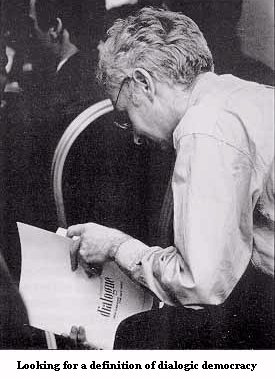
One cannot any longer follow that interpretation. If one looks
at Northern Ireland today - and one must look at it in
a globalising context - one can see that both the problems and the
opportunities which face it, or Ireland as a whole, are not different
from those faced by the rest of the world. Elsewhere, now, one
sees a new relationship between radical democratisation, on the
one hand, and resurgent fundamentalisms, including religious,
nationalistic and ethnic fundamentalisms, on the other.
These things are part of the global shake-out I'm describing;
in this context Northern Ireland looks, in a certain sense, typical,
rather than unusual. And the sort of institutional building blocks
that one would seek to create here are surely the same as those
we would look to construct in other European countries and in
other contexts, in which we must all now deal with this new intersection
between fundamentalism and democracy - forms of fundamentalism ringed
with violence, but in some sense in dialogue with democratisation
and with modernisation, in the form of economic development.
Not just here, but everywhere, if here particularly, there is
a question of what Charles Taylor has called the 'politics of
recognition'. The politics of recognition must be accommodated
in a pluralistic society. It entails recognising the authenticity,
the identity of different cultural groups who have different views -
whether these be religious or of other kinds - these views having
a right to be stated, to be heard and to be organised around.
The politics of recognition comes up against the politics of solidarity:
how does one build a multi-cultural society, a society in which
there is an effective politics of recognition but which still
has mechanisms of social cohesion? The simple answer is that we
don't yet know, but there's nothing very distinctive about Northern
Ireland, as compared to many other parts of the world where we
must seek to resolve the same problem.
What we're dealing with here is a genuinely global issue. In a
world where the nation-state won't look the same any more, we
can't confine problems of ethnicity, of religious pluralism, of
other kinds of claims to recognition within the nation-state's
sphere; we have to look for other ways of accommodating these
two forms of politics. I would see this as the struggle
for the early part of the 21st century - the struggle between the
two, but the possibility of accommodating them also.
When one thinks of the state, one no longer thinks of what one
used to think of. What is the United Kingdom? What is Northern
Ireland? What is Ireland? What is France? What is Canada? They
don't have the same resonance as they used to do, largely because
of the transformations I've mentioned. Nowadays, if one is in
one country, one is linked to other countries in a new fashion.
One is linked to the European Union, and many different forms
of accommodation - of federalism, of local autonomy - seem to be possible;
we're all pioneering these.
Look at what happened in Spain. Spain is still a country, but
with extraordinary autonomy for the regions. Catalonia, for example,
is more strongly linked, economically and culturally, to other
parts of the European Union than it is to Castille. Will this
be a pattern for the future?
Secondly, there is an intrinsic connection between democratisation,
pluralism and economic development, and this will apply in Northern
Ireland as elsewhere.
The relationship between democracy and economic development is
more complex than one might imagine. There's a new discussion,
for example, of the impact of authoritarianism on economic development,
when one considers the debate about Easternisation and the rather
unusual accommodation that seems to exist between fairly authoritarian
systems of political power in some of the eastern tigers' and
their very rapid economic development. Some people are again saying:
we don't need democracy, we don't need pluralism for economic
development; one needs an authoritarian outlook - maybe even what
the Chinese communists provided, and the Russian communists wrongly
eschewed with perestroika.
That's what some are saying, but I don't think it is true. There
is a close connection between democratisation and economic development.
Economic development is the condition for democratisation; therefore
discussion of economic partnership is crucial to the future of
this country[1]. But that partnership
is bound to entail new forms of democratic association - not just
the old relationship between markets, liberal democracy and the
nation-state. These things will no longer hold, here as elsewhere.
Thirdly, and finally, I was very pleased to see that the
name of the new think tank is Democratic Dialogue, because among
the new forms of democratisation which will be particularly important
for us, not just here but elsewhere, is what I call 'dialogic
democracy'.
Democracy means two things, really. On the one hand, it means
recognition of diversity of interests, so that one can form political
parties and other associations. On the other, democracy always
also means dialogue. It means the possibility of substituting
discussion for violence. And one of the main threads of democratic
theory in the west - and now across the world - has been the substitution
of dialogue for violence, of talk for bullets. The substitution
of talk for bullets is surely one of the great civilising contributions
of western, liberal-democratic theory.
Dialogic democratisation, however, is unlikely to be limited any
longer to the sphere of parliaments. Parliament plainly is a dialogic
system - it's a place where one debates things and, hopefully, one
reaches conclusions without the use of force. But in a world with
these new connections and disjunctions between local life and
global systems, one must look for forms of dialogic democratisation
which will run through from personal and family life to large
institutional systems.
I'd like to conclude by arguing that there is an inherent connection
between dialogue, violence and the possibility of living along
with others, both in gender relationships and in larger systems.
In both cases, one depends upon the possibility of what I call
a 'positive spiral of communication'. A positive spiral of communication
substitutes dialogue for violence and substitutes discussion - public
policy discussion - for the use of force to achieve one's ends.
We know that in violent marriages, where men are violent towards
women, such men can change. They can change through inner communication
and outer communication. We have many cases of successful therapeutic
intervention, where violent men do manage to substitute talk for
violence. When that occurs, it can produce a positive spiral of
communication: the more one gets to know oneself, the more one
gets to know the other; the more one gets to know the other, the
more one understands oneself.
This is a positive politics of recognition, where difference with
the other is a means to get to know oneself better which in turn
is a means of getting to know the other better, in a positive
spiral. There are many cases across the world of interaction between
religious groups, ethnic groups, cultural groups, where one does
see positive spirals of communication. I take it this will be
one of the meanings of Democratic Dialogue - the furthering of such
spirals of positive communication.
The question for us is how to avoid a relapse into negative spirals
of communication. If, in a positive spiral, in an emotional relationship,
love feeds on love, like feeds on like, tolerance feeds on tolerance;
in a deteriorating cycle of communication, hatred feeds on hatred.
What happened in Bosnia can't be understood in terms of what I
earlier called an atavistic view of history. What happened in
Bosnia wasn't just that centuries - old hatreds existed which had
never been accommodated, in an awkward corner of Europe which
had never modernised.
One certainly has to understand what happened in Bosnia in relation
to the past, but in relation to how that past is used in a globalising
context, where one has a new encounter - a global encounter - between
Islam and Christianity, an encounter between different modes of
modernisation. One doesn't simply have a reservoir of hatred lying
around for hundreds of years, ready to fuel conflicts. That isn't
really how hatreds work, in Ireland any more than anywhere else.
What one has is certain situations which can accentuate, can draw
upon, pre-existing antagonisms. Once these become communicated
as hatreds, then one can get a negative spiral of communication,
so that people who were previously neighbours, and had got along
quite well, can end up hating one another, to the degree they
are prepared to visit the most horrific brutalities upon one another.
Managing the global society of the future is not going to be a
matter of sending in UN forces to clear up areas of conflict - of
which there will be many - such as Bosnia. It's going to be a question
of somehow producing democratic institutions and creating interventions
which avoid negative spirals of cultural communication.
As with all I have been describing, this is an open future for
us. We can't really, any longer, use our past traditions of thinking
to understand it. In confronting this open future, while we certainly
see many difficulties, many uncertainties, we see many new possibilities
too.
Footnotes
[1] See next chapter
|




